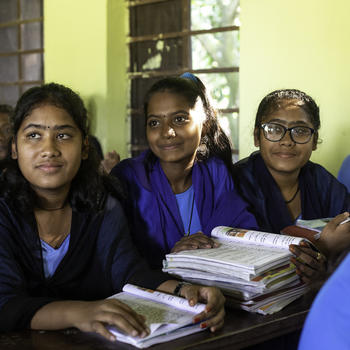It’s easy to take a simple toilet for granted. But 1.5 billion people – almost one in five of us – don’t have a decent one of their own.
Not having a decent toilet – at home, at school, in healthcare facilities – is dangerous for so many reasons.
It means there's no way of managing human waste properly, so deadly diseases like diarrhoea and cholera spread quickly. It means people have no choice but to go outside, which is especially unsafe for women and children.
And it means people often stop going to school or work if they're ill or on their period – meaning fewer opportunities to get an education, earn a living, and take control of their lives.
The power of a decent toilet
It might not look much, but this simple latrine has changed Dondoungou's life for good.
Until recently, Dondoungou Hanadoun’s family compound in Koumbia, southwestern Burkina Faso, didn’t have a toilet.
As a woman with a physical disability, Dondoungou faced a double layer of challenges: the only way she could relieve herself was by crossing a dangerously busy road on her motorised tricycle and searching for a hidden place in the bushes, where no passersby would see her. Twice, she was almost bitten by snakes.
But since we worked with our local partners to build a specially-adapted latrine right by Dondoungou’s house, she can go whenever she needs to – and as a result, enjoy a healthier, safer and more dignified life.
To relieve myself next to my house was shameful. But going into the bushes was also very dangerous.
[Now] I can go in and use it without any difficulty. It is a great joy and relief for me.
Sharing skills to bring lasting change
After refreshing his skills with training from our local partners, mason Abel Bonzi and his colleagues built 55 new latrines in Kosso, Burkina Faso. Now, Abel’s helping more households build their own toilets, and spreading the word about good hygiene and handwashing.

Keeping children in the classroom
Combined with clean water and good hygiene, decent toilets help children – especially girls, like 16-year-old Pushpa – stay safe, well, and ready to learn.
It’s difficult to concentrate on learning when school toilets are dirty, broken, or simply non-existent. Many children have no choice but to go outside, sometimes just metres away from where they play at breaktime.
For adolescent girls, the challenges are intensified when they start their period.
Without decent toilets or running water at school, many stay home for up to a week every month – falling further and further behind their male classmates, and often eventually dropping out entirely.
It's completely different these days. Girls don't miss lessons just because there are no pads or changing room.
Making sure no one's left behind
A new toilet isn’t much good if people can’t use it – so we encourage governments and decision-makers to consider everyone’s needs when building facilities.
And we work closely with our partners and community groups, supporting members like disability advocate Saidson Bruno to understand – and demand – their rights.
Facilities that last, whatever the weather
Bangladesh’s southern Khulna region, where rivers meet mangrove forest, has always been vulnerable to flooding and high tides.
But now, climate change is bringing higher sea levels and increasingly common extreme weather events like cyclones.
As a result, the fragile infrastructure here is often washed away – including the makeshift hanging toilets, perched above the river where human waste falls directly onto the bank below.
Slide to explore how we're working with communities here to help prepare for the impacts of climate change:
